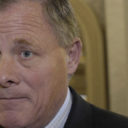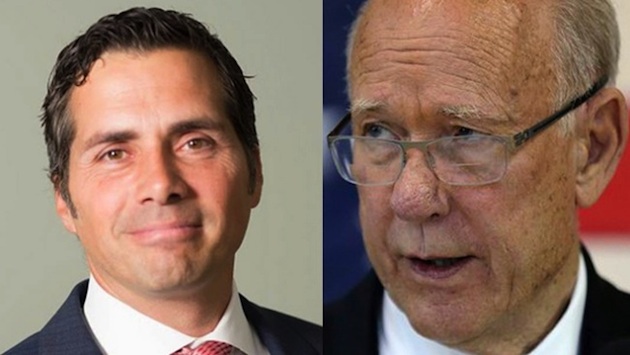
[show-map id=’1′]
LEGEND: SAFE DEM | LIKELY DEM | LEANS DEM | TOSS-UP | LEANS GOP | LIKELY GOP | SAFE GOP
As Republican candidates gain ground in contested Senate races nationwide, some incumbent Democrats are actually seeing their chances at reelection increase. While last time we released expanded analysis for four big Senate races moving into the Republican column, in this analysis we will we examining races moving against the GOP.
As was the case with our last analysis, there are three tabs for viewing, “Analysis, Polls and State Data.” Following the brief analysis for each race, we have also included past news, analysis, and commentary relevant to each race. But before we get into the top four disappointing races of the 2014 midterm election cycle for Republicans, it is important to recall that Republicans are now favored to net the needed six seats to reclaim control of the U.S. Senate.
With Montana, West Virginia and South Dakota all but gone already, the needed seats will likely be netted in Alaska, Arkansas, Louisiana and Colorado. It is also looking more and more likely that Iowa will soon join the other favored Republican states, but that’s another article.
[tabs id=”KSSen” title=”Kansas Senate Race – Roberts Vs. Orman”] [tab title=”Analysis”]

Democrat-turned-independent business Greg Orman (left), and incumbent Republican Sen. Pat Roberts (right).
The Republican Establishment really bungled the Kansas Senate race. With control of the U.S. Senate on the line, Washington Republicans knew full-well they could not afford to defend a seat in a deeply conservative state. But now that the Supreme Court of Kansas has ruled that Democrat Chad Taylor must be removed from the ballot, incumbent Sen. Pat Roberts will have to fend off a challenge from business Greg Orman in a two-way field. While most pundits view this as a greater challenge for Roberts, we aren’t sold on that assessment.
While the argument for why a two-way race hurts Roberts in the short run is valid, how it affects the race in the long-term could actually prove helpful to him. Sure, a divided opposition is usually a boon in politics, but going forward, the question is now whether Roberts can expose Orman for the Democrat he truly is. With Taylor still in the race this would be far more difficult to do.
Orman ran as a Democrat in 2008 and, Republicans accuse the Democratic Party of designing this tactic all along. We have spoken to former Taylor campaign operatives who now share Republicans’ suspicions. But this is just the first of a two-prong challenge Roberts must meet to save his own seat and, perhaps, a new Republican majority.
The polling in Kansas must be taken with a grain of salt. Aside from the state’s dominant Republican nature, Roberts is down because he is losing voters from his center to Orman and shrinking the electorate by losing voters on his right. We remain very skeptical that Orman can win this race because, not only does the Roberts camp have a few tricks up their sleeve, but we find it hard to believe conservatives who backed Milton Wolfe and others in the primary will allow Harry Reid to keep his position as majority leader.
Let’s first look at the state’s political leanings, which of course in all of the races, we encourage readers to follow-up with by looking at compiled data under “State Data” tabs.
Kansas has not elected a Democratic senator since President Franklin Delano Roosevelt first won the presidency. In the 98 years Kansan voters have been able to directly elected senators, since the pass of the Seventeenth Amendment, a majority or plurality of voters chosen a Democrat just three times, the last time in 1932. George McGill won a three-way race with 46 percent of the vote, but lost with 44 percent during his re-election bid just six years later. Republicans outnumber Democrats nearly 2 to 1 and, we know from the “Strongly Republican” PVI (Partisan Voting Index) that registered independents, who also outnumber Democrats, vote overwhelmingly Republican.
So, as we previously said, the real challenge for Roberts will be to stop Orman’s attempt at a great magic act — convince Kansan voters he’s not a Democrat. He will have help to do it. Former Kansas Sen. Bob Dole and Arizona Sen. John McCain, two highly revered and admired former presidential candidates, both hit the stump for Roberts last week, and former Florida Gov. Jeb Bush is heading there for campaign event this week. But it will be visits from Sen. Rand Paul (R-KY) and Rep. Paul Ryan (R-WI) in October that we will be watching the closest. Whether the two conservative icons are up to the task of helping to mend broken fences with conservatives will be significant.
The bottom line is that the Republican Party now finds itself in a self-created disaster, a product of each wing of the party always threatening to take their ball and go home if their guy doesn’t win the nomination. They will have to decide whether voting for the other Republican is as bad as allowing Democrats to keep control of the Upper Chamber.
On a final note, even if Roberts pulls it off in the end, which we believe he is still favored to do with a slight 56 percent chance of success, giving the Kansas Senate race a “Leans Republican” rating, he will have drained precious resources from national Republicans that were needed in other states such as North Carolina, New Hampshire and Michigan.
(Update: Roberts lost his statistical advantage on October 1. The race is now rated a “Toss-Up” though it still leans slightly 51 percent in the incumbent’s favor. The nearly identical statistical advantage, though statistically insignificant, is also enjoyed by Gov. Sam Brownback, who is now in a “Toss-Up” race, himself.)
News, Analysis & Commentary
I Don’t Think We’re In Kansas Anymore, RINO 9/4/2014
[/tab]
[tab title=”Polls”]
| Poll | Date | Sample | MoE | Orman (I) | Roberts (R) | Spread |
|---|---|---|---|---|---|---|
| PPD Average | 8/14 – 9/17 | — | — | 44 | 38.5 | Orman +5.5 |
| Rasmussen Reports** | 9/16 – 9/17 | 750 LV | 4.0 | 45 | 40 | Orman +5 |
| FOX News | 9/14 – 9/16 | 604 LV | 4.0 | 48 | 42 | Orman +6 |
| PPP (D) | 9/11 – 9/14 | 1328 LV | 2.7 | 46 | 36 | Orman +10 |
| KSN/SurveyUSA | 8/14 – 8/17 | 903 LV | 3.3 | 37 | 36 | Orman +10 |
(Please note: Our model uses separately calculated averages from weighted polls based on PPD’s Pollster Scorecard. Above is the raw spread and average.)[/tab]
[tab title=”State Data”]
POLITICS |
Kansas | National Average |
Partisanship |
||
| % Republican/Lean Republican | 47 | 39 |
| % Democratic/Lean Democratic | 34 | 43 |
| Registered Republicans | 765,398 | — |
| Registered Democrats | 422,181 | — |
| Unaffiliated/Undeclared | 535,160 | — |
| Registered Libertarians | 12,656 | — |
Ideology |
||
| % Conservative | 38 | 36 |
| % Moderate | 36 | 36 |
| % Liberal | 20 | 23 |
Presidential Job Approval |
||
| % Approve | 33 | 40 |
Partisan Voting Index |
||
| Strongly Republican | R+12 | — |
[/tab] [/tabs]
[tabs id=”MNSen” title=”Minnesota Senate Race – Franken Vs. McFadden”] [tab title=”Analysis”]
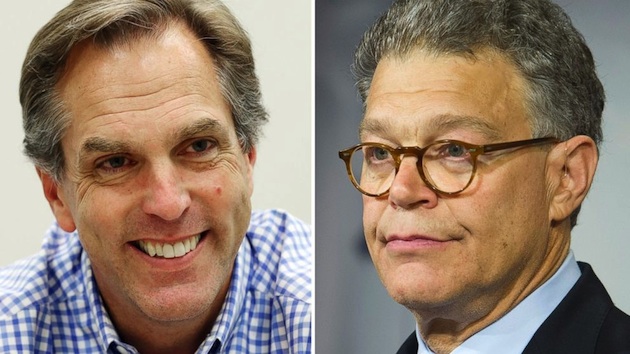
Left, in this June 12, 2014 file photo, Republican Senate candidate Mike McFadden is seen; right, Incumbent Sen. Al Franken (D-MN) speaks during a news conference on Capitol Hill in Washington. (Photos: Jim Mone/AP (left)|Cliff Owen/AP (right)
Even though the race in Minnesota remains volatile, we see incumbent Democrat Sen. Al Franken strengthening his position against against Republican businessman Mike McFadden. Franken, who operatives tell us is volatile himself, has managed to keep his low profile and avoid one of his foot-in-mouth symptoms from flaring up in public. This race remains a wildcard, however, for a number of reasons.
First, while Republicans tend to sink a ton of money into Michigan with the hope of turning the Wolverine State Red, Minnesota has actually been nearly two points more Republican in the last four presidential elections. It has voted even more Republican in the last three Senate races. This was on full display when we translated the Obama-Romney rematch poll into electoral votes. If the 2012 presidential election were held again today, Romney would carry Minnesota, yet still lose Michigan.
But there is something else still stewing underneath the surface.
Franken defeated incumbent Republican Sen. Norm Coleman by just 312 votes in a wave election for Democrats, and that was only after a lengthy recount process that suspiciously ended after someone “found” a few thousand more votes for Franken in their trunk. Did Franken and the Democrats steal the election? I don’t know, most likely. But it doesn’t matter what we think, only what the voters in the state think, and there are many who still feel robbed. In a midterm election cycle that all data suggest Republican enthusiasm will overwhelm Democrat turnout, the combination of uncertainties is alarming.
Franken would not have already spent $10 million by mid-summer on his reelection if he thought the polling was accurate. The average of polls continues to show Franken leading McFadden by just under 10 points, with the incumbents approval around the 50-percent threshold. But operatives from both campaigns tell us they believe this will be a low single-digit race.
A recent report from ABC News highlighted the impact the ISIS threat may have on the race, though it is unclear at this point how much of it is speculation. We simply do not have the data to tip us in either direction. But McFadden is hitting Franken on the lack of action in light of the reports an enormous number of ISIS fighters from America are from Minnesota, which has a large Muslim population and several known radical mosques. Franken contends he is on the problem, and has just sent a letter to Justice Department officials asking them for an update.
“Talk is cheap,” McFadden says in response. “Minnesota kids continue to be recruited. There has not been any policy put in place to stop this.”
We will be watching this development closely. Perhaps, with time running out, McFadden has hit his stride and concluded what we have been saying for months — that he must fight for every vote to win. But, as of now, Franken now has a 69 percent chance of defeating McFadden in November, just above the threshold to move the Minnesota Senate race back to the “Likely Democrat” rating we held it at for most of the cycle.
News, Analysis & Commentary
2014 Senate Predictions Update: GOP Favored, Wave Or No Wave – 8/4/2014
How ISIS Is Complicating Al Franken’s Election Bid – 9/16/2014
[/tab]
[tab title=”Polls”]
| Poll | Date | Sample | MoE | Franken (D) | McFadden (R) | Spread |
|---|---|---|---|---|---|---|
| PPD Average | 8/13 – 9/10 | — | — | 49.8 | 40.3 | Franken +9.5 |
| Star Tribune/Mason-Dixon* | 9/8 – 9/10 | 800 LV | 3.5 | 49 | 36 | Franken +13 |
| CBS News/NYT/YouGov | 8/18 – 9/2 | 3607 LV | 2.0 | 49 | 41 | Franken +8 |
| KSTP/SurveyUSA* | 8/19 – 8/21 | 600 LV | 4.1 | 51 | 42 | Franken +9 |
| Rasmussen Reports | 8/13 – 8/14 | 750 LV | 4.0 | 50 | 42 | Franken +8 |
(Please note: Our model uses separately calculated averages from weighted polls based on PPD’s Pollster Scorecard. Above is the raw spread and average.)[/tab]
[tab title=”State Data”]
POLITICS |
Minnesota | National Average |
Partisanship |
||
| % Republican/Lean Republican | 38 | 39 |
| % Democratic/Lean Democratic | 46 | 43 |
| Registered Republicans | N/A | — |
| Registered Democrats | N/A | — |
| Unaffiliated/Undeclared | N/A | — |
| Registered Libertarians | N/A | — |
Ideology |
||
| % Conservative | 34 | 36 |
| % Moderate | 36 | 36 |
| % Liberal | 26 | 23 |
Presidential Job Approval |
||
| % Approve | 42 | 40 |
Partisan Voting Index |
||
| Moderately Democrat | D+2 | — |
[/tab] [/tabs]
[tabs id=”NCSen” title=”North Carolina Senate Race – Hagan Vs. Tillis”] [tab title=”Analysis”]
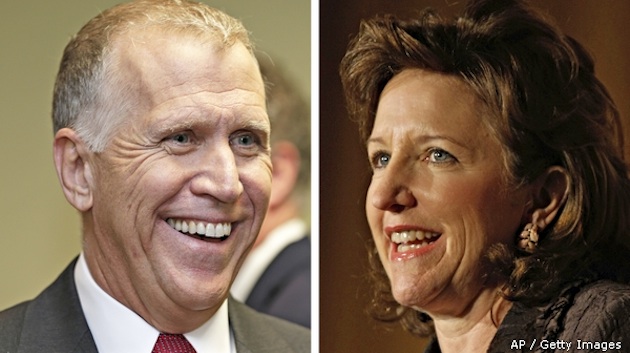
North Carolina Republican senatorial candidate and state House Speaker Thom Tillis (left) talks to the media after a debate at Davidson College in Davidson, N.C., Tuesday, April 22, 2014. He faces incumbent Democratic Sen. Key Hagan (right) in the North Carolina Senate race. (AP Photo/Chuck Burton)
The North Carolina Senate race is turning out to be one of — if not the most — difficult races in a state carried by Mitt Romney in 2012. After concluding an absolute bombardment of attack ads from Democratic groups was worth the money, we are moving this race back to a “Toss-Up” to reflect the now 54 percent chance Thom Tillis defeats incumbent Democrat Sen. Kay Hagan in November.
We realize that others see this race more favorably for the Democrat, but we are a “big picture” model that does not allow gyrations in poor polling outweigh the fundamentals of the race. Further, when we actually look at the polling everyone is so surprised over, we find more than enough reason to remain cautious.
The ad blitz no doubt damaged the image of Thom Tillis over the past few weeks, but Hagan’s lead is only the result of a modest improvement in her support, which remains below 45 percent. Meanwhile, the majority of her lead is the result of Tillis seeing his numbers plummet during the ad blitz. But we see evidence that his effort to improve image may be having an affect already.
In fact, just under two weeks ago it was slightly over 5 percentage points and is now just over 3 points, showing what is predictably soft support. Libertarian candidate Sean Haugh, who everyone agrees is taking more votes from Tillis than from Hagan, is beginning to see his support decline somewhat.
Further, we have repeatedly demonstrated the fact that robo-call polls are of poor quality, as is the case with both PPP and Rasmussen Reports. As far as polling North Carolina in general — among polls conducted at this point in the cycle — our research shows pollsters have projected results 3 – 5 points more Democratic than the actual vote results more than 70 percent of time.
Unlike say, Mitch McConnell in Kentucky, another incumbent with terrible approval ratings, Hagan cannot rely upon her state’s overwhelming political leanings. Our research into the Census data shows the increase in eligible black vote is simply not enough to combat the measured rightward shift documented by Gallup’s annual party ID by-state survey. In fact, it isn’t even clear whether “purple” is a correct characterization of the Tar Heel State, nor whether pollsters are even being realistic with their projected makeup of the midterm electorate.
For instance, Hagan’s 8.5-point margin against Sen. Elizabeth Dole in 2008 far outperformed typical Democratic candidates in the state, including President Obama who enjoyed overwhelming black turnout and support. However, that was in an environment so favorable to Democrats they won the popular vote nationwide in U.S. House races by 10.6 percentage points. That data suggest Hagan may not even have won that election in a neutral political environment, let along an environment favorable to the GOP. As of now, Republicans have a roughly 4-point lead on the generic congressional ballot, and a near-20-point lead in the states with competitive Senate races.
Still, Tillis has some major image repair to do if he wants to win this race, which is why candidate strength is so important. If Tillis ends up losing the race, it will have been the result of a sit back and play it safe strategy that enabled Democrats to exploit his role as State House Speaker. Regardless, with Hagan’s approval in the 30s, the competitiveness of this race — particularly the very real possibility they could lose it — is a huge disappointment for Republicans.
News, Analysis & Commentary
Analysis Of North Carolina Senate Race Finds A Tar-Heel ‘Toss-Up’ – 12/26/2013
NC Senate Polls Confirm Dems’ Fears: Hagan Is Hanging By A Thread, If That – 4/2/2014
Winds Of Change Blowing In North Carolina Senate Race – 8/7/2014
[/tab]
[tab title=”Polls”]
| Poll | Date | Sample | MoE | Hagan (D) | Tillis (R) | Spread |
|---|---|---|---|---|---|---|
| PPD Average | 9/8 – 9/18 | — | — | 44.5 | 41 | Hagan +3.5 |
| CNN Opinion Research* | 9/22 – 9/25 | 595 LV | 5.0 | 46 | 43 | Hagan +3 |
| High Point* | 9/13 – 9/18 | 410 LV | 5.0 | 42 | 40 | Hagan +2 |
| FOX News* | 9/14 – 9/16 | 605 LV | 4.0 | 41 | 36 | Hagan +5 |
| PPP (D) | 9/11 – 9/14 | 1266 LV | 2.8 | 46 | 42 | Hagan +4 |
| SurveyUSA/Civitas (R) | 9/9 – 9/10 | 490 LV | 4.5 | 47 | 46 | Hagan +1 |
| Rasmussen Reports | 9/8 – 9/10 | 1000 LV | 4.0 | 45 | 39 | Hagan +6 |
(Please note: Our model uses separately calculated averages from weighted polls based on PPD’s Pollster Scorecard. Above is the raw spread and average.)[/tab]
[tab title=”State Data”]
POLITICS |
North Carolina | National Average |
Partisanship |
||
| % Republican/Lean Republican | 41 | 39 |
| % Democratic/Lean Democratic | 42 | 43 |
| Registered Republicans | 2,007,545 | — |
| Registered Democrats | 2,759,488 | — |
| Unaffiliated/Undeclared | 1,791,357 | — |
| Registered Libertarians | 24,976 | — |
Ideology |
||
| % Conservative | 40 | 36 |
| % Moderate | 32 | 36 |
| % Liberal | 22 | 23 |
Presidential Job Approval |
||
| % Approve | 38.7 | 40 |
Partisan Voting Index |
||
| Moderately Republican | R+3 | — |
[/tab] [/tabs]
[tabs id=”ORSen” title=”Oregon Senate Race – Hagan Vs. Tillis”] [tab title=”Analysis”]
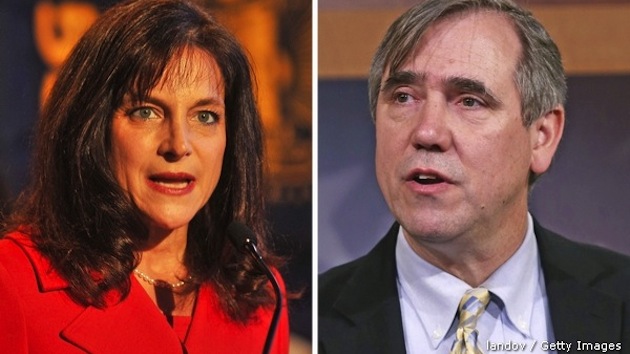
Republican U.S. Senate candidate Monica Wehby (left) holds her election night party in Oregon City. She is challenging Democrat incumbent Sen. Jeff Merkley (right) in the upcoming midterm elections. (Photos: Landov/Getty Images)
The Oregon Senate rating, itself, has not changed. But that shouldn’t be construed as a lack of movement in the Oregon Senate race. According to PPD’s 2014 Senate Map Predictions model, incumbent Democrat Sen. Jeff Merkley now has an 84 percent chance of defeating Republican challenger Monica Wehby in November, up from 74 percent first assigned in April.
Because a probability from 65 to 84 percent is assigned a “Likely” rating, we cannot stress enough how significant it is that Merkley has moved the needle just under a “Safe” rating. In a year when Democrats retaining control of the U.S. Senate is looking more and more difficult, it is a pretty extraordinary accomplishment.
We are offering only a brief recap, as we just explained our rationale in a recent update to this race. But it is worth noting that “candidate strength” is the problem for Republicans in this race, though other variables show the race was always going to be a heavy lift for the GOP.
Dr. Monica Wehby, a children’s brain surgeon, started off the leader of a small field of Republican candidates hoping to expand the 2014 Senate map by running particularly strong in Blue and Blue-leaning states. With Oregon’s ObamaCare disaster, and her unique medical profession and experience, she was in an excellent position to score an upset.
Yet, contrary to Mr. Karl Rove’s analysis, we are seeing a familiar story developing here. The Republican Establishment has a nasty way of dismissing serious stories without sufficient explanation, so when a recent headline emerged charging Wehby’s campaign of plagiarism involving the candidate’s policy proposals, they went into arrogant damage control mode.
After giving the campaign a week to explain themselves and receiving no response, we concluded their strategy was to hide. Make no mistake, this is a losing strategy and always has been. We are now seeing this in recent polling from SurveyUSA, though we don’t believe the margin is correct.
News, Analysis & Commentary
Wehby Plagiarism Story Made Worse By Disputed Excuse – 9/19/2014
Oregon Senate Race Unaffected By GOP Movement Nationwide – 9/22/2014
[/tab]
[tab title=”Polls”]
| Poll | Date | Sample | MoE | Merkley (D) | Wehby (R) | Spread |
|---|---|---|---|---|---|---|
| PPD Average | 8/18 – 9/24 | — | — | 48.3 | 35.0 | Merkley +13.3 |
| SurveyUSA | 9/22 – 9/24 | 568 LV | 4.2 | 52 | 32 | Merkley +20 |
| The Polling Company (R)* | 9/9 – 9/11 | 600 LV | 4.0 | 42 | 34 | Merkley +8 |
| Rasmussen Reports | 9/2 – 9/3 | 750 LV | 4.0 | 48 | 35 | Merkley +13 |
| CBS News/NYT/YouGov | 8/18 – 9/2 | 1541 LV | 4.0 | 51 | 39 | Merkley +12 |
(Please note: Our model uses separately calculated averages from weighted polls based on PPD’s Pollster Scorecard. Above is the raw spread and average.)[/tab]
[tab title=”State Data”]
POLITICS |
Oregon | National Average |
Partisanship |
||
| % Republican/Lean Republican | 39 | 39 |
| % Democratic/Lean Democratic | 44 | 43 |
| Registered Republicans | 650,601 | — |
| Registered Democrats | 821,423 | — |
| Unaffiliated/Undeclared | 503,689 | — |
| Registered Libertarians | 16,594 | — |
| Independents | 101,858 | — |
Ideology |
||
| % Conservative | 34 | 36 |
| % Moderate | 34 | 36 |
| % Liberal | 28 | 23 |
Presidential Job Approval |
||
| % Approve | 42.5 | 40 |
Partisan Voting Index |
||
| Moderately Democrat | D+5 | — |
[/tab][/tabs]




